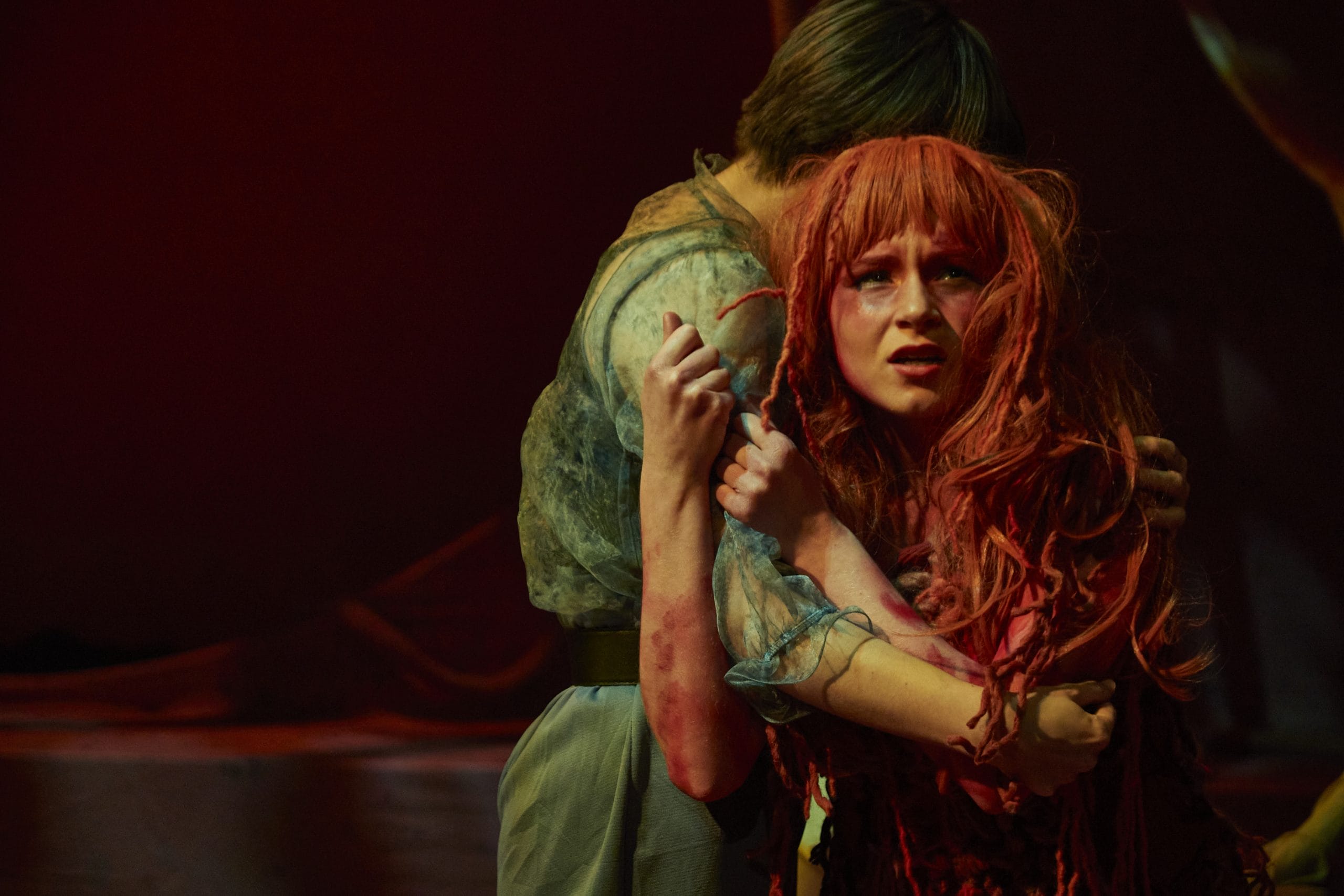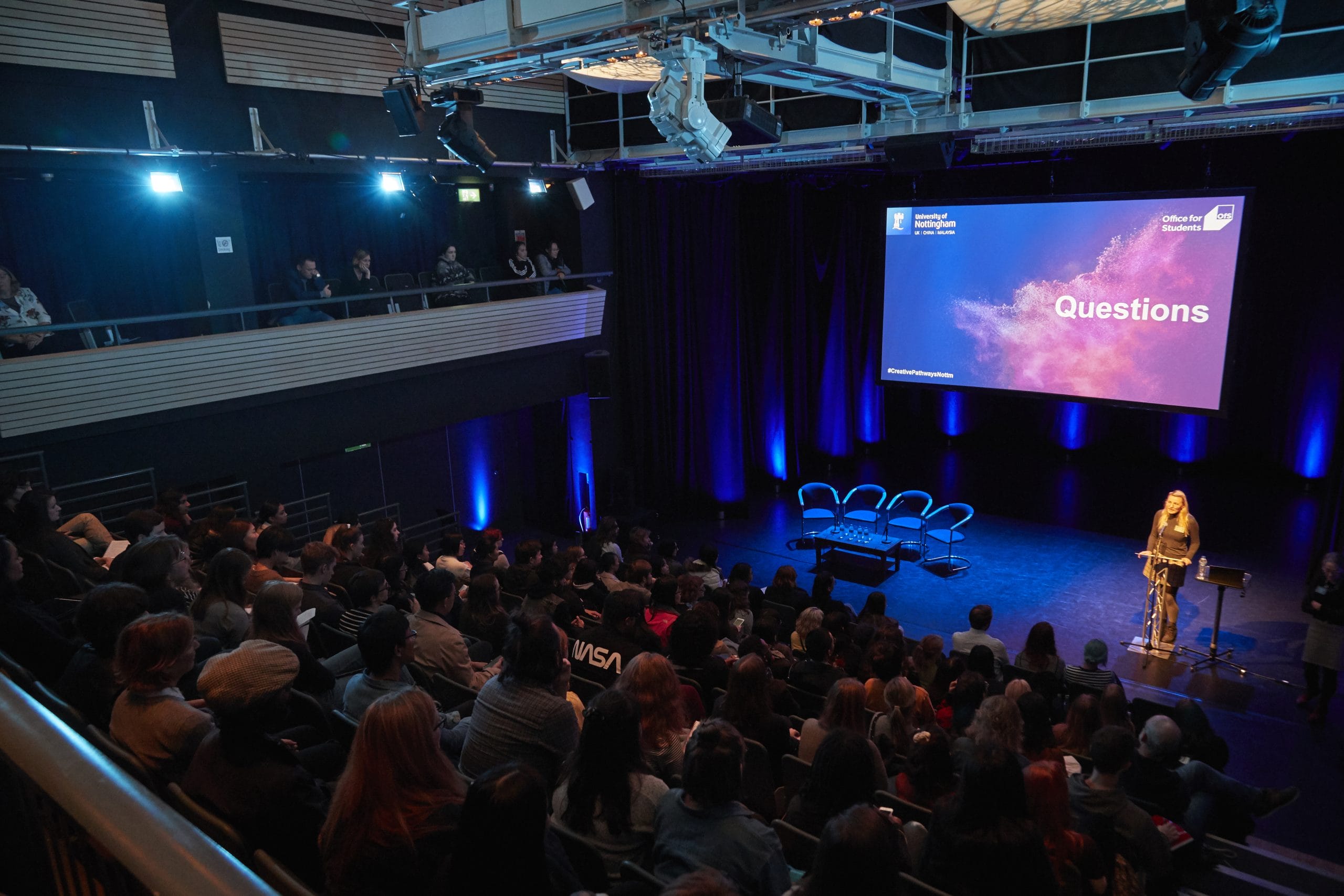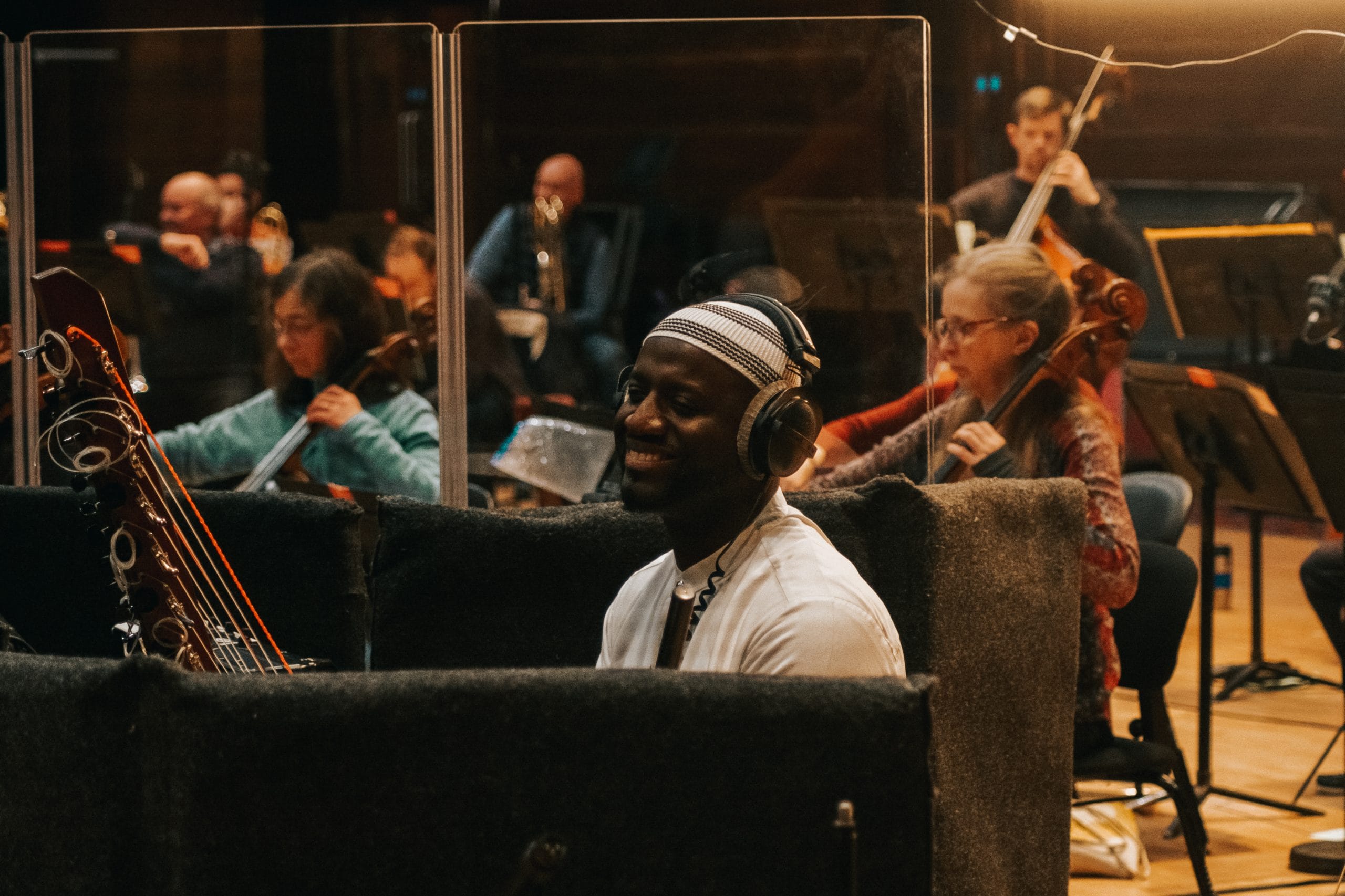Our Young Critics have recently reviewed Lakeside Arts, Make Good: The Post Office Scandal. Their feedback was given on Tuesday 29th of October 2024.
A creative collective of students that value collaboration and innovation. Together, they review and help shape future theatre programming.
Review
I found Make Good to be not only an extremely entertaining and moving musical, but also greatly educational in its authentic portrayal of those affected by the Post Office Scandal. The characters felt incredibly real, and their stories were particularly impactful after hearing about the depth of research that had been put into their creation. Not only were they incredibly well-written, but the actors each imbued their characters with such life and feeling that it was impossible as an audience member not be swept into their lives and empathise with each moment of sadness and anger in the visceral way that only live theatre can truly achieve.
For me one of the most engaging aspects of the performance was the way that the audience was encouraged to be a part of it. The opening comic address of the audience made me feel immediately very connected to the show, and I think helped to emphasise the reality of the story and the dreadful situation it presented. It also emphasised the intimacy of the show created by its small cast, personal stories, and the sense of familiarity in the post office set design. I feel that this created a very homely and connective atmosphere that accentuated the messages of community and joining together to make necessary changes in society, which I felt to be very significant and timely. The success at the end of the play, even after the many setbacks and failures on the way, finished it on a hopeful note that – far from negating the importance of outrage in response to issues like those in the play – showed the positivity and support that can be born from it.
Although doubts have been expressed about the telling of such an enraging example of injustice through musical form, I think that the songs were a necessary addition to the story, and equally effectively emphasised emotionally poignant moments, and breaks of comic relief. I was in awe of the talent of the instrumentalists, playing each song between only two or three people, and the variety of instruments that they played was so incredibly unique in comparison to most musicals that I have seen (I particularly enjoyed the harp and the banjo). Additionally, I feel that the sensitivity of the creative team was evident in the music, as they very effectively avoided trivialising or sugarcoating anything, but rather expressed the rawness of the characters’ emotions through the songs, and the cast’s incredible performance of them, and I loved the inclusion of a local choir in each performance as it makes it unique to every place and furthers the unifying themes of the show.
Overall, I thought that the show was immensely impactful and taught me a lot about the Post Office Scandal and the terrible consequences that innocent people faced because of it. I think it tells an extremely important story and is very relevant and inspiring in its portrayal of resilience to triumph over injustice.
Make Good: The Post Office Scandal is a moving new musical that brings to life one of the most significant miscarriages of justice in recent British history. Co-produced by Pentabus and New Perspectives and Directed by Elle While, the production masterfully combines storytelling, music, and community spirit to highlight the experiences of sub-postmasters who were falsely accused of theft, fraud, and financial mismanagement due to errors in the Horizon IT system. This dark chapter in British history saw many innocent individuals face financial ruin, isolation, and imprisonment for crimes they never committed, and this musical bravely tackles these harrowing realities with a blend of sensitivity and strength.
This is a heart-wrenching story that has a real impact on the audience, developed over three years, Make Good draws directly from real life stories from affected sub-postmasters, giving it a depth of authenticity that resonates deeply. The characters, such as Elsie, Mohandas, and Indira, embody the struggles, resilience, and heartbreak of the real people behind the scandal. Their stories highlight not just the devastating financial and emotional impacts but also the way systemic failures and prejudice tore at the fabric of their communities.
One of the themes that stands out in this production is racism. The show doesn’t shy away from addressing how the scandal disproportionately affected sub-postmasters from minority backgrounds specifically those from a South Asian background. Characters like Mohandas and Indira illustrate the added layer of prejudice, showing how ingrained racial biases compounded their suffering and further strained their fight for justice.
The powerful music creates an authentic atmosphere, composed by Jim Fortune and Maimuna Memon the music adds layers to the story that mere dialogue could not achieve. The songs range from soulful, emotive ballads to more upbeat hopeful pieces that bring together the audience such as the song ‘What is Age’ as the fourth wall is broken through the use of interactive theatre by getting the audience to sing along with the actors creating a sense of community within the audience. The live band, positioned on stage, enhances this connection, with instruments like electric piano, harp, and guitars creating a unique soundscape that underscores the emotions and transitions throughout the play.
The set, designed by Carla Goodman, effectively transports the audience to a small village post office. The slat wall set has warm, wooden textures and familiar clutter, it feels like a space filled with stories and memories. The poignant addition of a red and yellow post office sign and the central counter that is used in such an innovational and creative way as it changes form constantly from representing a post office counter to representing a dressing table.
What makes Make Good stand out is that it’s a community driven production. Each performance integrates local choirs, emphasizing the solidarity and unity of those affected by the scandal. This choice creates an atmosphere where the collective voice is celebrated, underscoring the strength found in community bonds. Beyond telling the story, the production also makes a real-world impact by donating 50% of its proceeds to the Horizon Scandal Fund, helping sub-postmasters rebuild their lives after years of struggle.
Make Good successfully conveys both the severity and humanity of the scandal. Despite the weighty subject matter, the show maintains a balance, infusing moments of humour, hope, and solidarity. This is evident as the characters raise a banner reading “SOS, Save Our Sub-postmasters” during the finale, which serves as a poignant reminder that this is not just a story about the past but a call to action for the future.
Make Good skilfully uses comedic relief to balance its heavy subject matter, weaving humour throughout the narrative to make the story more accessible and relatable. The show cleverly employs nostalgic jokes and references that resonate with multiple generations, bringing light-hearted moments that evoke memories of simpler times in small village post offices. These well-placed bits of humour not only offer the audience a moment to breathe but also enhance the authenticity of the characters, making their struggles feel all the more real. By blending laughter with serious themes, the musical creates a nuanced experience that appeals to a broad demographic, drawing in viewers from different backgrounds while maintaining the story’s emotional core.
Make Good: The Post Office Scandal is more than just a musical. It is a tribute to those who have suffered unjustly, a celebration of their unyielding spirit, and a powerful call for justice and empathy. With its strong performances, thoughtful writing, and a vibrant set, the production offers a deeply moving theatre experience that shines a light on systemic failures and prejudice, urging audiences to remember, reflect, and act.
Make Good is an incredible example of a musical done right. It took the stories of the Sub-Postmasters who were failed by the Post Office, a tragedy which has no words powerful enough to capture its heartache, and gave them all a voice.
At the very centre of Make Good is community.
The production itself includes different community choirs on each stop of their rural touring; a further layer that adds to the heart of this show. Its inclusion of ‘Patrick the Postman’, a character which frequently broke the 4th wall and prompted the audience’s engagement, emphasised the human need for community. It united a theatre of strangers and brought them together to echo the way the Sub-Postmasters did so for their community.
Through this, you felt the ache of the tragedy that befell the people who were valued so greatly within their community. The musical spotlighted the importance of humanity above all. As co-writer Jeanie O’Hare told BBC News, “we decided to believe a bit of tech rather than believe the living, breathing, amazing human beings who had been holding our communities together forever.” Make Good brings light to tragedy, mirroring the same way the Sub-Postmasters brought light, hope and friendship into the lives of those within their community. It is an anthem for the people who care about people. It is an anthem for every voice that has still not been heard. It is an anthem for community.
It was heart breaking, it was heart warming; it left you thinking, it left you remembering every single Sub-Postmaster who was failed by the company they made credible.
It left you with their legacy.
The musical is full of feeling. And that's what we need to portray to people now, so that they can feel and understand what we felt, all the heartache that we went through. The songs bring so much to the story, they're heartfelt and there's humour in it too, it's funny. It made me smile as well as being touching."
Sub-postmaster
Review
1. ‘If you make good some damage, a loss, or a debt, you try to repair the damage, replace what has been lost, or repay the debt’ – Collins English Dictionary
On Tuesday 22nd October, I had the fantastic opportunity to watch Make Good: The Post Office Scandal. A co-production between rural theatre companies Pentabus and New Perspectives, this new musical follows the Horizon scandal, where hundreds of sub-post masters were wrongly convicted of stealing from the Post Office.
You’ve probably heard of the ITV drama, which launched the story into public consciousness. Yet, this musical has been in the works for three years, with writer Jeanie O’Hare meticulously researching the scandal and combining different sub-postmasters’ experiences within the show.
But a musical, really? I was originally sceptical of whether chorus numbers would be the most appropriate vehicle to discuss this miscarriage of justice. However, I now believe that nothing could more aptly capture the raw emotion of this story. Here’s why.
2. ‘If someone makes good a threat or promise or makes good on it, they do what they have threatened or promised to do’– Collins English Dictionary
Undoubtedly, Make Good did what it promised to do. It absolutely delivered. I walked away feeling educated, angry, passionate… wiping away a tear.
Which is no mean feat from a cast of just four. Make Good’s actors are incredibly talented, with some of the most effective multi-roling that I’ve ever seen. From changing set to costume to accents, the show’s choreography was slick and infused with humour. Adding to moments of comedy, the fourth wall was often broken by our narrator/sub-postmaster/musician, which was equally useful to explain technical Post Office jargon.
My favourite part? Despite my original hesitation, I fell in love with Make Good‘s music. I was impressed by the power and dexterity of only three musicians. Rather than a traditional musical with jazz hands and dance breaks, the songs were more like an extension of characters’ emotions – albeit with one fabulous, audience-interaction dance number, ‘What Is Age?’. The songs weren’t gratuitous yet played a major role in the plot, giving the audience a moment to soak in the story.
3. To make good is ‘to recompense or repair damage or injury’ – Collins English Dictionary
Before the show, I had the rewarding opportunity to meet with actor Samuel Gosrani and director Elle While. We discussed their engagement with real sub-postmasters, whose positive reception of Make Good highlights the show’s authenticity.
I learned a lot. There’s still work to be done to highlight racism within the Post Office court trials; Jeanie O’Hare was keen for two of the onstage sub-postmasters to be of South Asian heritage. She also chose to use local choirs in each touring location to beautifully represent
the local community touched by the scandal – when the choir sang, their haunting, communal sound sent shivers down by spine.
This discussion gave me a new perspective on the show. Audience members could have benefited from an epiloque-esque scene (think the movies before they roll the credits) where the true story was linked to the show, as I would have loved to have seen these directorial decisions brought out more explicitly.
4. Make Good is also a new musical that everyone should go and see
Honestly, I surprised myself by how much I loved Make Good. It’s wholly unique to have a non-fiction musical about an ongoing event. After the show and a much-deserved standing ovation, there was a genuine buzz in the theatre, with audience members filling out forms and donating. For me, a group of theatregoers taking a photo with the ‘Justice for Sub-Postmasters’ banner really sums up the power of Make Good. What had moments before been a prop in the musical became a real symbol for change, reflecting this blurring of fiction and reality, and the power of theatre.
I left the theatre looking at tour dates, wanting my family to buy tickets. Even if (especially if!) you don’t know anything about the Post Office scandal, I’d recommend this musical to anyone who enjoys beautiful storytelling, gorgeous music and gut-punch acting.
It’s time to make good, in every sense of the word.
The Make Good: The Post Office Scandal’ performance at Lakeside Arts is a vastly undervalued story told through powerful songs and moving scenes. Written by Jeanie O’Hare and directed by Elle While, this musical turned out to be something completely unexpected.
Whilst some might question Jeanie’s decision to write this performance as a musical, once having watched the show, audiences would think again before questioning her creative direction. Make Good is filled with humour, emotion and is incredibly performed by the brilliant actors.
The beginning of the show is a faultless start to the musical, with Ed Gaughan’s, playing Patrick the Postman, witty humour as he introduces the story. The involvement of the audience with the song ‘What is Age?’ immediately creates a connection with the actors and the audience, whilst also adding to the anticipation for the rest of the musical. The songs play a huge role in conveying the story, and they do it well! The songs towards the end of the musical especially convey the emotions that is encapsulated in every person that had been effected by this scandal. The harsh, dramatic lighting and the emotion in the actor’s voices as they sing shows the anger and frustration the post office workers at the time felt extremely well.
Before the musical began, we got a chance to speak to Elle While and Samual Gosrani, playing Mohandas. They had told us that the characters in the musical were based on stories taken from many Sub postmasters affected by the scandal. This makes the musical all the more realistic and moving; knowing that this had happened to so many people for so many years is heartbreaking, and Jeanie’s writing displays this heartbreak amazingly.
This musical incredibly encapsulates the story of the post office scandal in a way that many audiences have never thought of before. It is a must watch to understand the emotional turmoil that the Sub postmasters went through for so many years, and depicts, not only the story, but the intensity of emotions that these people actually suffered through.
On Tuesday, I had the pleasure of going to see the second ever performance of Pentabus and New Perspectives’ original musical Make Good at the Lakeside Arts Theatre here in Nottingham. The play is about the Post Office Scandal, and as both theatre companies involved in the production of this musical are rural, their joint purpose is to tell the stories of the small, intimate communities and individuals affected by the grave miscarriage of justice that was The Post Office Scandal. Jeanie O’hare (the writer) was incredibly thorough in ensuring that she interviewed and researched the scandal and spoke to many of the victims and their families, and in doing so, created her characters, born from interweaving stories from different individuals, ensuring a wide breadth of experiences are told throughout her play. The musical felt fresh and emotional, and as a still ongoing court case, it felt incredibly relevant to today’s society, and was not a story that I was largely aware of before.
I found that community felt like the absolute heart and crux of the performance, and could be seen on so many different levels, but the most important element of community came through in the music. One might question why a musical was selected as the way through which to tell such an abhorrent story, and perhaps was even a question I asked myself before watching, but the portrayal of The Post Office Scandal was dealt with such beautiful tact and respect that the music only added to the emotion and sense of togetherness in the play. Telling the outrageous story through the Arts and music allows the stories of the victims to connect to audiences far more than they do in news headlines and articles. The music provides an emotional connection to the stories, and I found myself getting goosebumps and teary eyed at moments throughout watching – something that could never be achieved in the same way by watching simple dialogue. Samuel Gosrani (a member of the cast) said himself in an interview before the show, that he felt that music is able to create a ‘community anthem’ – and in the terms of this musical, was a way through which victims’ characters can connect and find strength in their togetherness, as well as a way to get through to those in the audience who have ignored the news stories. Both he and the director Elle While, who we also had the honour of talking to before the performance, made it clear that the music was not there for the sake of creating a flashy musical, but was there to create the sense of community that is at the very centre of both their theatre company, and purpose of creating the play. I also loved how this ‘community anthem’ was tied into the play through the local choir who joined the theatre company in their performance. A new choir will join each location as the musical tours, establishing a sense of connection to location, as well as with the people in our communities.
The speeches that punctured the reprise at the end of the play were incredibly moving, and tied in the relevance of the message about community and justice. The ending of the play felt most memorable and emotional for me, and I even shed a tear at Elsie’s (one of the main sub-postmaster characters) final speech. Each speech from each character acted as a reminder of how some people didn’t live to see themselves exonerated, and how cruel and unjust the scandal has been to not just individuals, but their families and friends, and stretches out far into their entire community. I liked how the name of the play acts as a call to justice that the Post Office must Make Good their horrendous wrongdoing. The musical was incredible, with phenomenal acting, cleverly positioned moments of comedy and poignance and gorgeous songs, and I feel so lucky to have had the opportunity to have seen it – especially if I admit that it would not have normally been something I might have chosen to go and see
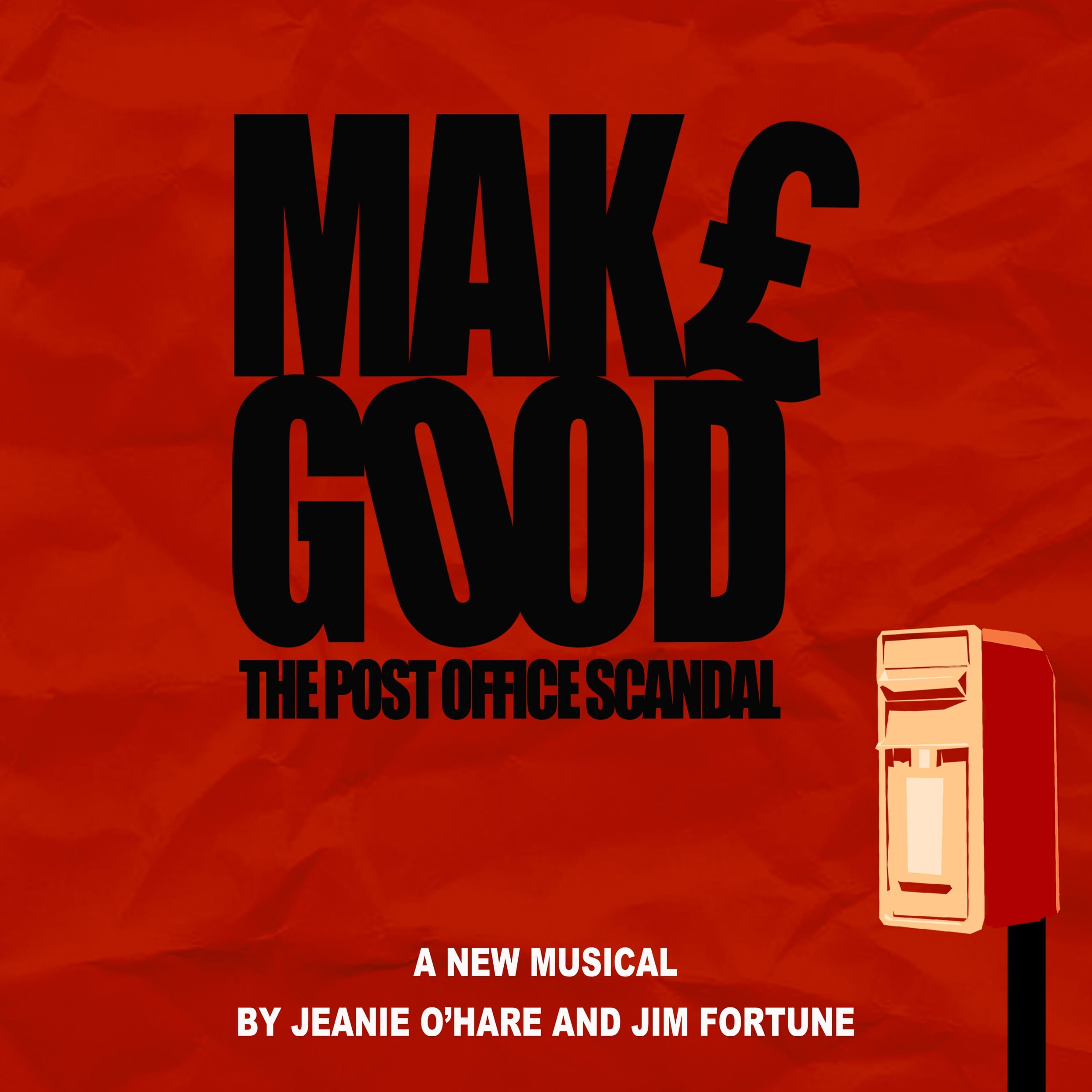
Make Good

Make Good
Review
Summary
During the performance I picked up on three main areas of the production which I felt struck me the most. As an overall point however, I would say that the way they portrayed the post office scandal was beautifully done since they were able to merge the facts of what happened, something that an audience member may read, with the addition of the fictional relationships and lives that the characters had, which allowed for an emotional range that may not always be explored when delving into the post office scandal.
Props/ Scenery
The first thing I found very striking was the use of one scenery piece that was the main piece for the duration of the play. This being the “post office counter”. In a literal sense I felt it had a lot of meaning since it was the place where the “root” of the issue was held, this being the computer system and the receipt machine. But it was also the place where the characters had emotional moments, such as when characters were leaning over the top of the counter stressing over the numbers. Most interestingly however, they also used this piece of scenery for the “antagonistic” characters of the show, such as the caller help lines. This broad use of a single piece of scenery is striking and to me reflects how all these characters are woven together. This specific scenery choice reminds me of the 2016 revival of Falsettos, and in both that production and Make Good, this directorial choice comes off as very effective to an audience member.
Lighting
The use of lighting throughout the production was, in my opinion, one of its biggest storytelling methods. One scene that comes to my head would be when the three leading characters are in court and the judge questions the validity of the computer and instead of hearing a voice the audience is met with a series of computerized noises and patterns of lights at the back of the stage. This is powerful as the musical attempts to disconnect the audience from understanding the computer or the system all together. That is impactful since most of the audience may understand computers and may not get how these people fell victim of these systems but having this undetectable noise that is confusing to an audience member playing, puts the audience in the shoes of the characters and makes them understand that the victims of the post office scandal were put in this confusing situation that even a modern day audience might not be able to fully grasp.
On approaching this new production, audiences, as I was, are probably wondering how such a sensitive topic like the Post Office scandal can be represented as a musical, and how accurate a retelling of events it is. Whilst this isn’t a direct recount of events, the creative team have approached the subject with respect and empathy, aiming to honour the unheard voices of those grievously affected by this great injustice. The musical’s plot revolves around the experiences of many sub-postmasters, and deliberately creates fictional characters who live out an amalgamation of these stories. No one individual is singled out, or one person’s experience with the Post Office prioritised over another’s, instead this fictional element allows all those who suffered to be honoured and feel heard.
A cozy, domestic atmosphere is established through the set and lighting to help draw you into the community onstage. Thus you are fully invested in the events, although the musical utilises humorous fourth wall breaks, and multiple references to popular culture, to lighten the mood and amuse the audience. As a younger member of the audience I was pleasantly surprised at how many references I understood, and didn’t feel I lost any aspect of the comedy through the ones I didn’t understand. I was also grateful for the explanations of official terms and practices integrated into the dialogue aimed directly at the audience. These allowed the action to flow seamlessly and the emotion of scenes to take centre stage, emotion that is heightened by the songs thoughtfully placed throughout.
Every song seemed to be directed entirely at the audience, rather than between the characters onstage, thus emphasising the sentiment of a moment, rather than developing the story like songs in more traditional musicals might do. For example, the importance of community is felt by all those in the theatre, as the first time the choir joins in with the cast is during a song that repeatedly states ‘you were never the only one’. The clear lyrics combined with the mass voices of the choir emphasises how many people were affected by this and how they have been united by their suffering. We are reminded how significant a supportive community can be as we see our three main characters shunned from their initial social circles. We experience their feelings of hopelessness and heartbreak as their personal relationships disintegrate as a direct consequence of the outrageous lie the Post Office stood by for so long. We see their found family as the JFSA (Justice For Sub-postmasters Alliance) is formed onstage before our eyes, and take heart in how comfort was found through each other.
Overall, this joint venture between Pentabus and New Perspectives, supporting those affected by the post office scandal, feels like a small but significant step in trying to ‘Make Good’ the injustices sub-postmasters have suffered.
I went to see Make Good: The Post Office Scandal as part of the Lakeside Arts Creative Programmers Collective on Tuesday 22nd October. It was a collaborative production by Pentabus & New Perspectives with a cast of four actors. It was a moving, heartfelt production that left me feeling empowered to continue to fight for justice.
Prior to watching this show, I was expecting it to be interesting and informative, as the Post Office Scandal was something I had heard of only briefly beforehand. What I did not expect was to feel so emotionally invested in so many different characters’ lives, as these four actors multi-roled so beautifully and seamlessly, stepping into different relationships, songs and stories. In this way, several fictionalised characters were effectively used to create an amalgamation of many real life
stories.
Something which I particularly enjoyed was the depiction of South Asian stories on stage, as postmasters from these backgrounds were disproportionately affected by the scandal. Both Mohandas and Indira were from South Asian backgrounds, and Mohandas portrayed a second-generation immigrant who was ostracised after his family had worked for generations in the Post Office in India. Therefore, I felt that the racism inherent within the Post Office’s handling of the scandal was highlighted through these stories, something which is often left out in news around the scandal.
Ed Gaughan played ‘The Postman’, a character who acted as a bridge between the actor and the audience at several key moments. This was extremely effective for many reasons, but for me as someone who knew relatively little about the Post Office scandal, he explained key events and terminology to us which definitely enhanced my viewing experience. It underlined Pentabus & New Perspective’s commitment to telling the story accurately, but also in an accessible way for their audience. His character also incorporated an element of meta-theatre into the production, and once he even led all of us in the audience in song. This was only one example of communal singing during
the performance as they also utilised a live community choir at many points. For me, this really emphasised the theme of a local community, which is crucial to this show as the postmasters were so ostracised from their communities, instead conveying a show of unity.
When we met with Samuel Gosrani, (the actor playing Mohandas) and the Artistic Director Elle While before the show, they explained how many might initially think that a musical was an odd medium to tell such a serious story. However, they said that they had realised that the way that people tend to connect with stories is through the emotional impact and a musical would help to foster this personal connection. I particularly recognised this through the song that was sung at both the beginning and the end of the show with the refrain ‘You are not the only one/You never were the only one’. I felt that this poignantly contrasted with the message that the postmasters were given by the helplines throughout the show that they were the only one having these issues, exposing the painful injustice inherent in this scandal. This song being sung at the show’s finale, along with the actors holding up a banner reading “Justice for our Subpostmasters” left me feeling empowered to fight for justice, and it was clear that this was the show’s aim. This was reflected when subsequently the actors encouraged the audience to donate to New Perspectives & Pentabus whilst mentioning that for this show they were gifting 50% of their donations to the Horizon Scandal Fund.
Overall, the show both made me laugh and brought me to the verge of tears, as I experienced the emotional turmoil that the Post Office Scandal brought. I would thoroughly recommend this show to everyone whether they know about the scandal or not. It left me with newfound knowledge about ‘one of the biggest miscarriages of justice in British history’ and absolutely wanting to learn more!
Review
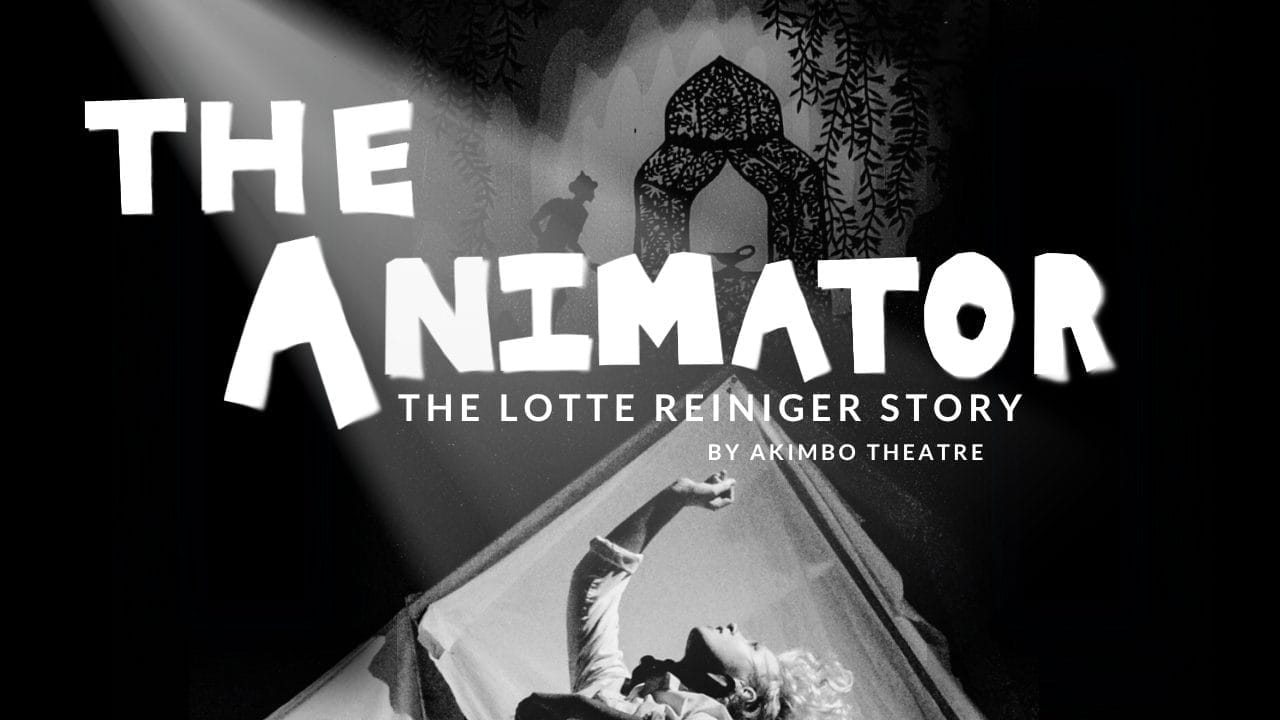

Mon 3 Mar 2025
Young Critics Collective: The Animator
Our talented group of Young Critics have recently reviewed the Akimbo Theatre Company production of The Animator. Stepping into the captivating world of Lotte Reiniger, the visionary who created the very first feature-length animation film, our seven Young critics give their opinions on this dynamic performance.
Review


Tue 3 Dec 2024
Young Critics Collective: Mariposa
Our Young Critics have recently reviewed DeNada Dance's show Mariposa, a queer tragedy inspired by Puccini's Madame Butterfly.
Review


Wed 12 Feb 2025
Young Critics Collective: Rosy Carrick Musclebound
Our Young Critics have recently reviewed Rosy Carrick's Musclebound; One woman’s quest for freedom, pleasure and real sexual power. Their feedback was received on Wednesday 12th of Feb 2025.
Review
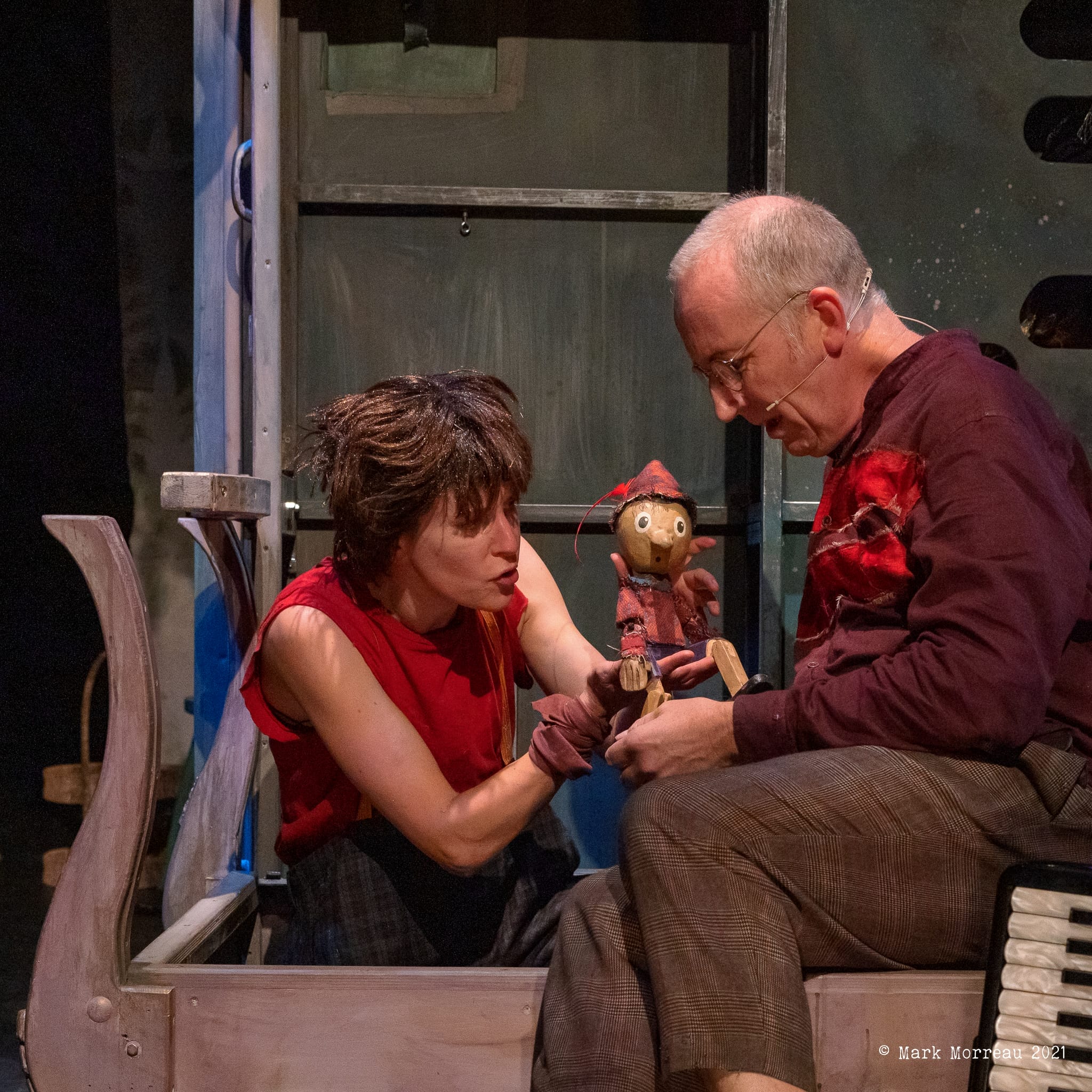

Sun 10 Nov 2024
Young Critics Collective: Pinocchio
Our Young Critics have recently reviewed Stuff and Nonsense Theatre Company's Pinocchio. Their feedback was given on Sunday the 10th of November 2024.
Review


Mon 3 Mar 2025
Young Critics Collective: The Animator
Our talented group of Young Critics have recently reviewed the Akimbo Theatre Company production of The Animator. Stepping into the captivating world of Lotte Reiniger, the visionary who created the very first feature-length animation film, our seven Young critics give their opinions on this dynamic performance.
Review


Tue 3 Dec 2024
Young Critics Collective: Mariposa
Our Young Critics have recently reviewed DeNada Dance's show Mariposa, a queer tragedy inspired by Puccini's Madame Butterfly.
Review


Wed 12 Feb 2025
Young Critics Collective: Rosy Carrick Musclebound
Our Young Critics have recently reviewed Rosy Carrick's Musclebound; One woman’s quest for freedom, pleasure and real sexual power. Their feedback was received on Wednesday 12th of Feb 2025.
Review


Sun 10 Nov 2024
Young Critics Collective: Pinocchio
Our Young Critics have recently reviewed Stuff and Nonsense Theatre Company's Pinocchio. Their feedback was given on Sunday the 10th of November 2024.













